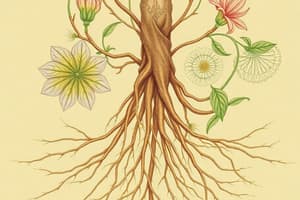Podcast
Questions and Answers
Which area of study focuses on the classification and identification of plant species?
Which area of study focuses on the classification and identification of plant species?
- Plant Physiology
- Plant Pathology
- Plant Ecology
- Taxonomy & Systematics (correct)
What is a primary objective of Botany MSc programs?
What is a primary objective of Botany MSc programs?
- To develop artistic skills related to botany
- To provide in-depth knowledge of plant biology (correct)
- To promote outdoor fitness activities
- To train for sales careers in gardening supplies
Which skill is NOT typically developed in Botany MSc programs?
Which skill is NOT typically developed in Botany MSc programs?
- Plant cultivation and husbandry
- Data collection and interpretation
- Use of scientific instruments for research
- Techniques in culinary arts (correct)
What does research methodology in botany frequently involve?
What does research methodology in botany frequently involve?
Which area of study examines interactions between plants and their environments?
Which area of study examines interactions between plants and their environments?
Which career is commonly available to graduates of Botany MSc programs?
Which career is commonly available to graduates of Botany MSc programs?
What aspect of botany research emphasizes sustainability?
What aspect of botany research emphasizes sustainability?
Which method is commonly used in molecular techniques for plant research?
Which method is commonly used in molecular techniques for plant research?
Flashcards are hidden until you start studying
Study Notes
Objectives of Botany MSc Programs
- To provide in-depth knowledge of plant biology, including physiology, ecology, genetics, and taxonomy.
- To develop research skills through hands-on laboratory work and field studies.
- To prepare graduates for careers in academia, research, conservation, and agriculture.
Key Areas of Study
-
Plant Physiology
- Study of plant functions, including photosynthesis, respiration, and nutrient uptake.
- Understanding hormonal regulation and signaling pathways.
-
Plant Ecology
- Interactions between plants and their environments.
- Ecosystem dynamics and plant community structure.
-
Plant Genetics & Biotechnology
- Genetic variation and inheritance in plants.
- Applications of genetic engineering in agriculture and conservation.
-
Taxonomy & Systematics
- Classification and identification of plant species.
- Phylogenetics and evolutionary relationships among plants.
-
Plant Pathology
- Study of plant diseases and their management.
- Understanding the interactions between plants and pathogens.
Research Methodologies
- Field studies for ecological and environmental assessment.
- Laboratory experiments focusing on plant physiology and biochemistry.
- Molecular techniques, including DNA sequencing and gene mapping.
Practical Skills Developed
- Techniques in plant cultivation and husbandry.
- Use of scientific instruments for research and analysis.
- Data collection, statistical analysis, and interpretation of results.
Career Opportunities
- Academic positions (professorships, research roles).
- Government agencies (conservation, environmental management).
- Private sector (agriculture, biotechnology firms).
- Non-profit organizations (conservation and advocacy).
Important Considerations
- Emphasis on sustainability and conservation in botany research.
- Integrative approaches combining various disciplines (e.g., ecology, genetics).
- The importance of interdisciplinary collaboration in solving global challenges like climate change and food security.
MSc in Botany Objectives
- Provides comprehensive understanding of plant biology, encompassing physiology, ecology, genetics, and taxonomy.
- Develops research skills through practical laboratory work and field studies.
- Equips graduates for careers in academia, research, conservation, and agricultural fields.
Key Areas of Study
Plant Physiology
- Focuses on the functions of plants, including photosynthesis, respiration, and nutrient uptake.
- Explores hormonal regulation and the intricate mechanisms of signaling pathways within plants.
Plant Ecology
- Examines the complex interactions between plants and their surrounding environments.
- Delves into the dynamics of ecosystems and the structure of plant communities.
Plant Genetics & Biotechnology
- Investigates genetic variation and inheritance patterns in plants.
- Explores the applications of genetic engineering in agriculture and conservation efforts.
Taxonomy & Systematics
- Focuses on the classification and identification of different plant species.
- Explores phylogenetic relationships and evolutionary connections amongst plants.
Plant Pathology
- Studies plant diseases and develops strategies for their management.
- Investigates the interactions between plants and pathogens.
Research Methodologies
- Field studies for ecological and environmental assessments.
- Laboratory experiments dedicated to plant physiology and biochemistry.
- Utilizes molecular techniques, including DNA sequencing and gene mapping.
Practical Skills Developed
- Techniques in plant cultivation and husbandry.
- Proficiency in utilizing scientific instruments for research and analysis.
- Skills in data collection, statistical analysis, and result interpretation.
Career Opportunities
- Academic positions, including professorships and research roles.
- Government agencies involved in conservation and environmental management.
- The private sector, within agriculture and biotechnology companies.
- Non-profit organizations dedicated to conservation and advocacy.
Important Considerations
- Emphasizes sustainability and conservation within botany research.
- Promotes integrative approaches, combining various disciplines like ecology and genetics.
- Highlights the importance of interdisciplinary collaboration to address global challenges like climate change and food security.
Studying That Suits You
Use AI to generate personalized quizzes and flashcards to suit your learning preferences.




